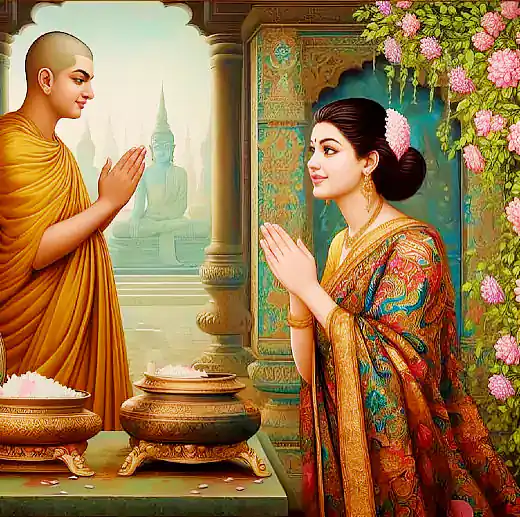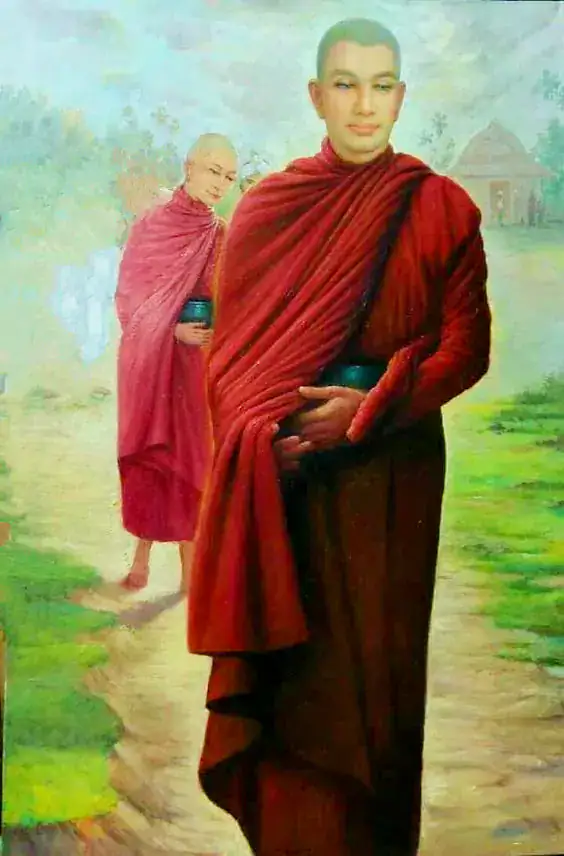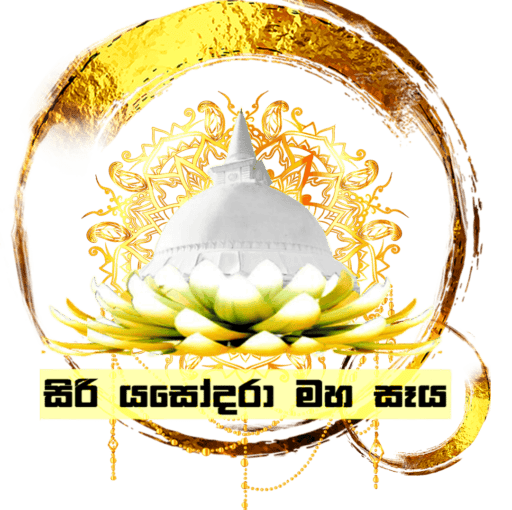Cūlasubhaddā
(and her Father-in-Law, Ugga)

-
Save
While the Buddha was residing at Jetavana in the good city of Sāvatthi, he gave a sermon beginning with “Dūresanto pakāsenti” in connection with the merchant Anāthapiṇḍika’s daughter, Cūlasubhaddā. The details were as follows:
Ugga, who was another merchant, a citizen of Ugga City, was the childhood friend of the merchant, Anāthapiṇḍika. While they were educated by the same teacher, they promised to each other that when they grew up and had children, one who had a daughter should give her in marriage to a son of the other who wanted her to be his daughter-in-law.
The two friends grew up and became great merchants in their respective cities. One day, the merchant, Ugga, went to the house of Anāthapiṇḍika in Sāvatthi with five hundred carts to do business. Anāthapiṇḍika called his daughter, Cūlasubhaddā, and assigned a duty to her, saying:
“Dear daughter, your father (my good friend), Ugga, the merchant has come. Do all that is necessary for him.”
“Very well,” said Cūlasubhaddā and from the day of Ugga’s arrival, she prepared and cooked the food personally. She put on flowers, perfumes and unguents, etc. While the merchant was being fed, she kept the bath-water ready and after he had taken his bath, she personally supervised all the needful for him with respect.
Observing her possession of the character of a good housewife, the merchant Ugga was pleased with Cūlasubhaddā. Then one day, while conversing cordially with Anāthapiṇḍika, he reminded his friend saying:
“Friend, when we were young we have made such and such a pledge to each other,” and then asked Cūlasubhaddā for his son.
But Ugga was a heretic. So Anāthapiṇḍika did not make any decision (on his own) and reported the matter to the Buddha, who seeing Ugga’s former good deeds that would contribute to his attainment of fruits in future, approved. He then discussed with his wife, Puññalakkhaṇa Devī, and they agreed to his friends proposal.
He fixed the date and elaborately arranged for the wedding ceremony, and when he sent Cūlasubhaddā away in marriage, he called his daughter and gave ten pieces of advice which were the same as those given to Visākhā by her father, Dhanañjaya.
“My dear daughter, a woman who lives in the house of her parents-in-law:
(1) should not take outside the fire that is inside her house, (that is, she should not tell people in other houses about the faults of her parents-in-law and husband);
(2) should not bring into her house the fire from outside (that is, when the neighbours speak ills of her parents-in-law and husband, she should not report it to them);
(3) should give only those who give back, (that is, she should lend only to those who punctually return what they have borrowed from her house);
(4) should not give those who do not give back, (that is, she should not give another loan to those who do not punctually return what they have borrowed from her house);
(5) should give others whether they give her or not, (that is, when poor relatives come to her house, she should give them whether they can afford to give or not);
(6) should sit well, (that is, she should stand up first at the sight of her parents-in-law and husband. It is not proper for her to remain sitting when she should stand up);
(7) should eat well, (that is, she should not eat before her parents-in-law and husband but she should serve them and eat only after making sure everybody has his or her food);
(8) should sleep well, (that is, she should not sleep in her bed before her parents-inlaw and husband do. She should sleep only after doing her duties towards them);
(9) should serve the fire respectfully, (that is, she should regard her parents-in-laws and husband as a great mass of fire or a poisonous serpent nāga king and look at them respectfully. She should not look at them disrespectfully by casting a side glance or frowning upon them);
(10) should worship the devas in the house, (that is, she should show respect to her parents-in-law and husband, regarding them as the devas occupying the foremost or most sacred place of the house).
These were the ten pieces of advice which Anāthapiṇḍika gave to his daughter as did the merchant Dhanañjaya to his daughter Visākhā.
He also sent eight wise men as guarantors along with his daughter with these instructions:
“Whenever a problem crops up to my daughter Cūlasubhaddā you must solve it lawfully.”
The day of her departure saw him giving alms lavishly to the Sangha headed by the Buddha. Then he sent his daughter to the merchant Ugga’s house with great pomp and ceremony as though he exhibited the magnificent fruition of the good deeds which Cūlasubhaddā had done in her previous lives.
Arriving at Ugga City, she was welcomed by the merchant’s family and hosts of the citizens. Like Visākhā, she entered the city standing in her chariot, and making the people much impressed by her glory and splendour. She accepted the presents sent by the citizens and sent in return gifts appropriate to their distinguished status and thus by virtue of her wisdom she endeared herself to the whole city.
When her heretical father-in-law honoured the naked ascetics (acelakas) on auspicious occasions at his house, he sent for her as he wanted her to come and pay respect to his teachers. But she refused to go to the place where they were being honoured because she was so shy to see the unclothed teachers.
The merchant Ugga sent for her repeatedly but Cūlasubhaddā remained adamant in her refusal. So the merchant became furious and ordered her to be turned out of the house. She refused to take such unreasonable treatment. Instead she called in the eight wise men her guarantors, and stated her case openly. They decided that she had no fault and informed the merchant accordingly.
The merchant told his wife that Cūlasubhaddā did not pay respect to his teachers, saying that they had no sense of shame. The merchant’s wife wondered what kind of monks were the teachers of her daughter-in-law whom she extolled so excessively.
So she summoned Cūlasubhaddā and asked her:
Kīdisā samaṇā tuyhaṃ
bāḷhaṃ kho ne pasaṃsasi.
Kim sīlā kim samācārā
taṃ me akkhāhi pucchitā.
Our daughter-in-law Subhadda! How are your teachers and monks possessed of noble qualities? Extremely do you praise them. (Those teachers of yours, the Monk Gotama and his disciples), what virtues of distinction do they have? What kind of good conduct do they show? As you are asked, tell me truthfully about that.
Then Cūlasubhaddā, desiring to talk to the wealthy merchant and to his wife about the qualities of the Buddha and His disciples, uttered the following verse:
(1) Santindriyā santamānasā
santaṃ tesaṃ gataṃ ṭhitaṃ.
Okkhittacakkhū mitabhānī
tādisā samaṇā mama.
(Madam) Those monks of mine (comprising the Exalted One and His disciples) in contrast to the fickle and self-indulging behaviour of your teachers, are mentally serene, being free from the heat of all defilements. Therefore, their walking with their steps like lotus flowers or their standing with their twin golden feet, is so calm that the faith of the beholders increases. They have their down-cast eyes that never look beyond the length of a yoke. They speak moderately of what is in accord with time and place. My Teacher, the Exalted One, and His disciples possess such impressive attributes.
(2) Kāyakammaṃ sucī nesaṃ
vācākammaṃ anāvilaṃ
Mano-kammaṃ suvisuddhaṃ
tādisā samaṇā mama.
(Madam) All the physical behaviour of my Teacher, the Exalted One, and His disciples, is clear of unwholesomeness and pure; their verbal behaviour is serene by nature without the dust and mud of unwholesomeness, all their mental behaviour is free from the stain of evil character. They possess such impressive attributes.
(3) Vimalā saṅkhamuttābhā
suddhā antarabāhirā.
Puṇṇā, suddhehi dhammehi
tādisā samaṇā mama.
(Madam) They (my Teacher, the Exalted One, and His disciples) are free from moral defilements like the conch-shell or a pearl necklace. They are pure both inside and out, having no dust of fault at all. They are fully endowed with the three kinds of pure training. They possess such impressive attributes.
(4) Lābhena unnato loko
alābhena ca onato
Labhālabhena ekaṭṭhā
tādisā samaṇā mama.
(Madam) In the world, people become puffed up with pride when they acquire many things owing to their possession of effort now (payogasampatti) and their good deeds in the past. They become depressed when they do not acquire anything owing to their lack of effort now and their evil deeds in the past. But my Teacher, the Exalted One, and His disciples, are not affected by acquisition nor non-acquisition of things, but remain calm and tranquil. They posses such impressive attributes.
(5) Yasena unnato loko
ayasena ca onato.
Yasāyasena ekaṭṭhā
tādisā samaṇā mama.
(Madam) In this world people they became puffed up with pride when they become famous and have many followers owing to their possession of effort now and good deeds in the past. They become depressed when they cease to become famous and have fewer followers owing to their lack of effort now and their evil deeds in the past. But, my Teacher, the Exalted One, and His monk-disciples are not affected by having fame or having no fame and by having only a few followers, but remain calm and tranquil. They possess such impressive attributes.
(6) Pasaṃsāy unnato loko
nindāyā’pi ca onato.
Samā nindāpasaṃsāsu
tādisā samaṇ mama.
(Madam) In this world people become puffed up with pride when they are praised owing to their effort now and good deeds in the past. They are depressed when they are dispraised owing to their lack of effort now and their evil deeds in the past. But my Teacher, the Exalted One, and His monkdisciples are not affected by praise or by dispraise, but remain calm and tranquil. They possess such impressive attributes.
(7) Sukhena unnato loko
dukkhenā’pi ca onato.
Akampā sukhadukkhesu
tādisā samaṇā mama.
(Madam) In this world, people become puffed up with pride when they are affluent owing to their effort now and good deeds in the past. They become depressed when they are poor owing to their lack of effort now and their evil deeds in the past. But my Teacher, the Exalted One, and His monk-disciples, are not affected by affluence, but remain calm and tranquil. They possess such impressive attributes.
Thus, Cūlasubhaddā, the wise daughter-in-law, pleased her father-in-law and her mother-in-law, by extolling the Exalted One and His disciples. The merchant’s wife asked her whether she would be able to show them her teacher, the Exalted One and His disciples, and Culasubhadda said she could do so. Then her mother-in-law told her to make an arrangement so that they could see her teacher and all.
Having promised thus, Cūlasubhaddā prepared great offering for the Buddha and the Sangha on the top of the mansion and facing towards the Jetavana monastery (as she was so far from Savatti), she paid respect to the Buddha and contemplated His attributes.
Then honouring the Buddha with sweet smelling flowers, and perfumes, she resolved thus:
“Glorious Buddha, I invite the Sangha headed by the Exalted One to my good deeds at my house. May the Exalted One, the Teacher of devas and humans, know my invitation quite well through these Jasmine flowers which I am now sending.”
After extending her invitation, she threw up eight handfuls of Jasmine flowers into the air. Like small butterflies, the flowers travelled by air and became a flower-canopy above the Buddha, while He was preaching amidst four classes of people in the Jetavana monastery.
At that moment the merchant Anāthapiṇḍika who had heard the Dhamma, invited the Buddha to his house the next day to his good deeds. The Buddha replied that He had already accepted the invitation to the meal offering by another donor. The merchant said:
“There is no one who has come and invited the Exalted Buddha before me. Whose meal-offering have You accepted?”
The Buddha replied that He had been already invited by Cūlasubhaddā. The merchant said:
“But, Glorious Buddha, is not my daughter Culasubhaddā living in Ugga which is one hundred and twenty yojanas away from this city of Sāvatthi?”
The Buddha replied: “You are right, merchant but good people can manifest as if they were standing before Me even though they may be living in a place that is many yojanas away.”
Then the Buddha uttered the following verse:
Dūre santo pakāsenti
himavaṇto’va pabbato.
Asantettha na dissanti
rattiṃ khittā yathā sarā.
Merchant Anāthapiṇḍika, donor of Jetavana! Though people, pure at heart and doers of good deeds, may stay many yojanas away, they manifest themselves to My knowledge as does the Himavanta forest. Though foolish monks and lay persons, exist near Me, they never manifest themselves in the neighbourhood of My vision like the arrows shot in the darkness of four characteristics, namely, midnight, moonless, in the heart of the forest and under all cloudy sky.
By the end of the discourse, many people attained the Fruition of Sotāpatti.
The Buddha’s Journey to Ugga.
Knowing that the Buddha had accepted Cūlasubhaddā’s invitation, Sakka told Vissakamma Deva to create five hundred turreted flying vehicles in which the Buddha and His monks were to be taken to Ugga the next day. The next day, Vissakamma stood at the gate of the Jetavana monastery, after creating five hundred flying vehicles.
The Buddha took the batch of the five hundred choice Arahats as His entourage, and they, one seated in each vehicle, travelled by air to Ugga City.
Looking forward with his followers to the Buddha’s arrival, as instructed by his wise daughter-in-law Cūlasubhaddā, Ugga saw the Buddha coming with great glory. Overwhelmed by devotion, he welcomed and honoured the Buddha with flowers, scents, etc. After performing alms-giving, he invited the Buddha now and then and repeated his great offering for seven days.

-
Save
The Liberation of Ugga and 84000 Beings
The Buddha preached the Dhamma that suited Ugga. As a result, he and his wife, together with eighty-four thousand beings, realized the Four Truths and became liberated.
In order to show His grace to Cūlasubhaddā, the Buddha told Thera Anuruddha to stay behind in Ugga and, Himself and the rest of the Arahats returned to Savatthi. From that day onwards the city of Ugga became a great centre of the faith and a city devoted to the Triple Gem.
——Pakiṇṇaka Vagga, Dhammapada Commentary, Vol. II.——
(From the book : The Great Chronicle of Buddhas | by Ven. Mingun Sayadaw)
